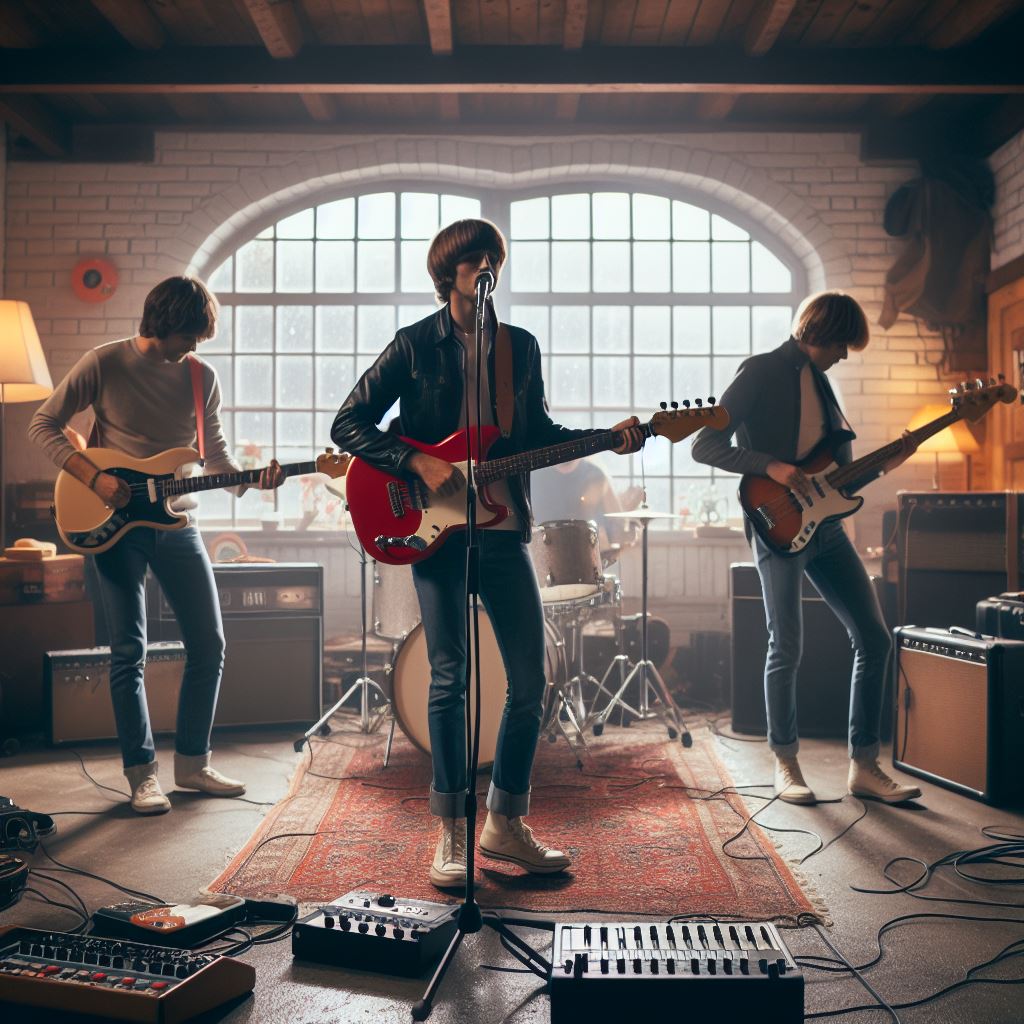Introduction
Brief introduction of the topic
In the dynamic realm of music creation, understanding UK copyright laws is paramount.
Musicians navigate a complex landscape governed by legal intricacies.
Copyright laws serve as the guardians of intellectual property, safeguarding the fruits of creative labor.
The importance of copyright laws for musicians in the UK
Introducing this vital subject, we delve into the very essence of copyright laws, decoding their significance for UK musicians.
Beyond mere legal jargon, these laws form the bedrock of artistic protection, ensuring that musicians reap the rewards of their artistic endeavors.
In essence, copyright laws empower musicians, granting them exclusive rights to their musical works.
This exclusivity spans reproduction, distribution, performance, and adaptation, offering a comprehensive shield against unauthorized use.
Musicians, in embracing this legal framework, not only secure their artistic legacy but also open avenues for potential financial gains.
As we embark on this exploration, envision the journey as a roadmap for musicians to navigate the intricate web of copyright laws.
It’s not just about legalities; it’s about empowering artists to thrive in an industry that thrives on creativity.
Join us on this enlightening journey through the intricacies of copyright laws, where knowledge becomes the key to unlocking the full potential of musical expression.
Understanding Copyright Laws in the UK
Understanding copyright laws is essential for musicians in the UK to protect their creative works and prevent unauthorized use.
Basics of copyright laws
- Copyright refers to the legal protection given to creators of original works, such as music compositions and recordings.
- The duration of copyright protection in the UK extends for the lifetime of the creator plus an additional 70 years.
- Copyright owners are granted exclusive rights, including the right to reproduce, distribute, and publicly perform their work.
Overview of copyright infringement
- Copyright infringement occurs when someone violates the exclusive rights of a copyright owner without permission.
- Forms of infringement can include unauthorized copying, distribution, or public performance of copyrighted material.
- Consequences of infringement can be severe, with legal penalties such as fines, injunctions, and damages.
As a musician in the UK, it is crucial to be aware of copyright laws to protect your creative output and avoid legal complications.
Understanding copyright laws
- Copyright is a legal protection that gives exclusive rights to creators of original works.
- In the UK, copyright protection lasts for the creator’s lifetime plus an additional 70 years.
- Copyright owners have the right to control the use and distribution of their work.
Copyright infringement overview
- Copyright infringement occurs when someone uses copyrighted material without permission.
- Infringement can take different forms, such as unauthorized reproduction, distribution, or public performance.
- Copyright infringers can face serious consequences, including fines, injunctions, and financial damages.
For UK musicians, understanding copyright laws is essential for safeguarding their intellectual property and avoiding legal issues.
Read: From Garage to Gigs: UK Bands’ Journeys
Personalized UK Career Consulting
Receive tailored career guidance designed just for you. Get actionable steps and expert support to boost your career in 1-3 days. Take control of your career now.
Get StartedCopyright Protection for Musicians
How copyright protection applies to musical compositions
Musical compositions, defined as original works, enjoy copyright protection, ensuring creators safeguard their artistic endeavors.
This shield extends to both lyrics and melodies, offering comprehensive coverage.
Importance of copyright registration for musicians
Registration, a crucial step, bestows benefits, enhancing legal recourse and solidifying ownership.
Learn the easy UK registration process through the Intellectual Property Office (IPO).
This step not only strengthens your legal standing but also serves as evidence in case of infringement disputes.
The role of Performing Rights Organizations (PROs)
Dive into the realm of Performing Rights Organizations (PROs), integral to the UK music scene.
Joining a PRO empowers musicians with copyright enforcement tools.
PROs, such as PRS for Music, actively monitor and collect royalties for public performances of your work.
Their role extends beyond monetary gains, providing a support system for artists navigating the complexities of the music industry.
Understanding how these organizations operate is crucial for musicians seeking to maximize their copyright protection.
Additionally, being part of a PRO not only ensures proper compensation but also opens up networking opportunities and resources.
Stay informed, register your work, and consider affiliating with a PRO to fully leverage the benefits of copyright protection in the vibrant UK music landscape.
Read: Balancing Gigs & Life: UK Musicians’ Tips

Fair Use and Copyright Laws
The concept of fair use in the UK
The concept of fair use is an important aspect of copyright laws in the UK.
Your Dream Job Starts with a Perfect CV
Get a tailored CV and cover letter that captures your unique strengths and stands out in your industry. Let us help you make an unforgettable first impression.
Get StartedIt allows individuals to use copyrighted material without permission from the rights holder, under certain circumstances.
Definition of fair use
Fair use is defined as a limited and non-infringing use of copyrighted material, such as for criticism, comment, news reporting, teaching, scholarship, and research.
It aims to balance the rights of the copyright owner with the public’s interest in accessing and utilizing creative works.
Factors considered for fair use determination
When determining fair use, UK courts consider several factors.
These factors include the purpose and character of the use, the nature of the copyrighted work, the amount and substantiality of the portion used, and the effect of the use on the potential market for the original work.
The purpose and character of the use refer to whether the use is transformative or commercial.
Transformative uses, such as parody or criticism, are more likely to be considered fair use.
Moreover, the nature of the copyrighted work plays a role in fair use determinations.
Generally, using factual works may be considered fairer than using highly creative or fictional works.
The amount and substantiality of the portion used is another crucial factor.
Using a small portion of the copyrighted work is more likely to be considered fair use, especially if it does not impact the economic value of the original work.
Lastly, the effect of the use on the market for the copyrighted work is considered.
If the use negatively impacts the copyright owner’s ability to profit from their work, it may not qualify as fair use.
The limitations and exceptions to copyright in the UK
In addition to fair use, the UK also provides various limitations and exceptions to copyright.
Optimize Your LinkedIn for Success
Boost your LinkedIn profile with a professional bio, keyword-rich headline, and strategic recommendations that attract recruiters. Stand out from the crowd and get noticed.
Optimize NowThese exceptions allow certain acts to be performed without infringing copyright.
For example, individuals are allowed to make copies of copyrighted works for private study or non-commercial research purposes.
Musicians also benefit from fair dealing exceptions, which specifically apply to their creative endeavors.
For instance, musicians can use copyrighted material for the purpose of criticism or review.
They are also allowed to quote from copyrighted works, as long as proper attribution is given and the quotation is not excessive.
In the UK, fair use and fair dealing exceptions strike a balance between protecting the rights of copyright owners and allowing individuals, including musicians, to make reasonable use of copyrighted material.
However, it is essential for musicians to understand the limitations and scope of these exceptions to avoid potential copyright infringement issues.
It is always advisable to seek legal advice or consult with professional organizations to ensure compliance with copyright laws.
Read: Earning as a Musician in the UK Today
Enforcing Copyright as a Musician
Steps to enforce copyright as a musician
- Monitoring and detecting copyright infringement is a crucial step for musicians.
- By actively searching for unauthorized use of their work, musicians can identify potential infringers.
- Once copyright infringement is detected, musicians can take action by sending cease and desist letters.
- A cease and desist letter is a formal notice demanding the infringer to stop using the copyrighted material.
- It serves as a warning and an opportunity for the infringer to rectify the situation before facing legal consequences.
- If the infringer fails to comply with the cease and desist letter, musicians may need to resort to legal action.
- Taking legal action involves hiring an attorney who specializes in copyright law.
- The attorney will help musicians navigate the legal process and protect their rights.
- Legal action can result in injunctions, which prohibit the infringer from further use of the copyrighted material.
- Monetary damages can also be awarded to musicians if the court finds the infringement to be willful.
Challenges faced by musicians in copyright enforcement
- One of the significant challenges musicians face is proving ownership and infringement of their work.
- Copyright infringement cases require substantial evidence to establish the originality of the musician’s creation.
- This evidence can include registration certificates, timestamps, and documentation of the creative process.
- However, collecting and presenting this evidence can be a time-consuming and complicated task.
- Another challenge is the cost implications associated with taking legal action to enforce copyright.
- Hiring an attorney and pursuing litigation can be expensive, particularly for independent or emerging musicians.
- Legal fees, court costs, and potential expert witness fees can significantly impact a musician’s financial resources.
- Moreover, the duration of legal proceedings can also drain a musician’s time and energy.
- While copyright infringement can cause financial harm to musicians, pursuing legal action may not always be feasible.
- This creates a dilemma for musicians who need to balance their artistic integrity with practical considerations.
In a nutshell, enforcing copyright as a musician involves a series of steps, including monitoring for infringements, sending cease and desist letters, and taking legal action if necessary.
However, musicians face challenges in proving ownership and infringement, as well as the potential cost implications of pursuing legal remedies.
Despite these obstacles, protecting one’s creative work is essential for musicians to receive fair recognition and compensation for their contributions to the music industry.
Read: Day in the Life of a UK Session Musician
Conclusion
Summarizing the rich tapestry of our exploration, we’ve delved into the intricacies of UK copyright laws for musicians, decoding the labyrinth that protects artistic endeavors.
The resonance of our melody within legal boundaries underscores the paramount importance of comprehending copyright laws.
It’s not merely a legal necessity; it’s the linchpin that secures your artistic legacy.
As you navigate the harmonies and dissonances of the legal symphony, consider diving deeper into authoritative resources.
The Intellectual Property Office and Musician’s Union offer invaluable insights and updates, ensuring you traverse the copyright landscape with confidence.
Your musical journey deserves the shield of knowledge, and these resources are the compass guiding you through the dynamic terrain of copyright laws in the UK.
[E-Book for Sale]
500 Cutting-Edge Tech Startup Ideas for 2024 & 2025: Innovate, Create, Dominate
$19.99 • 500 Tech Startup Ideas • 62 pages
You will get inspired with 500 innovative tech startup ideas for 2024 and 2025, complete with concise descriptions to help you kickstart your entrepreneurial journey in AI, Blockchain, IoT, Fintech, and AR/VR.




